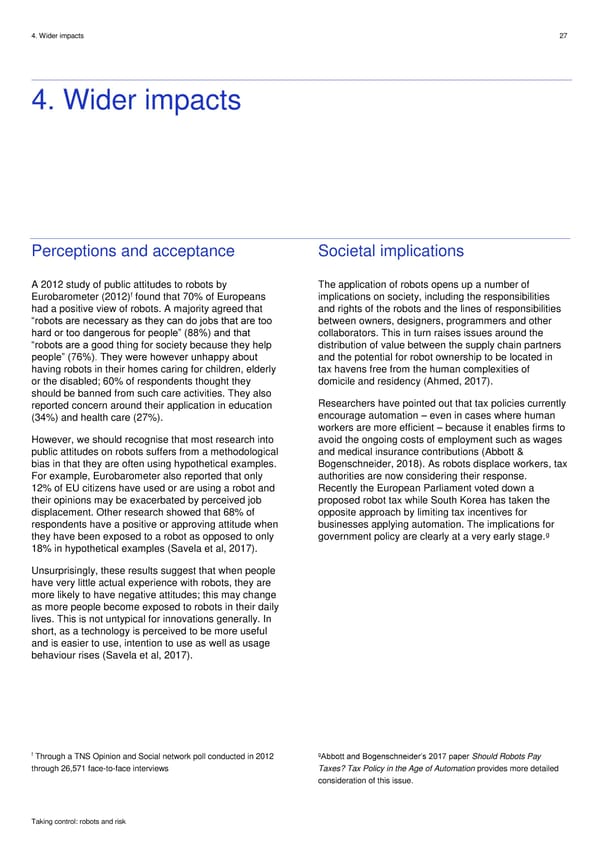4. Wider impacts 27 4. Wider impacts Perceptions and acceptance Societal implications A 2012 study of public attitudes to robots by The application of robots opens up a number of f Eurobarometer (2012) found that 70% of Europeans implications on society, including the responsibilities had a positive view of robots. A majority agreed that and rights of the robots and the lines of responsibilities “robots are necessary as they can do jobs that are too between owners, designers, programmers and other hard or too dangerous for people” (88%) and that collaborators. This in turn raises issues around the “robots are a good thing for society because they help distribution of value between the supply chain partners people” (76%). They were however unhappy about and the potential for robot ownership to be located in having robots in their homes caring for children, elderly tax havens free from the human complexities of or the disabled; 60% of respondents thought they domicile and residency (Ahmed, 2017). should be banned from such care activities. They also Researchers have pointed out that tax policies currently reported concern around their application in education encourage automation – even in cases where human (34%) and health care (27%). workers are more efficient – because it enables firms to However, we should recognise that most research into avoid the ongoing costs of employment such as wages public attitudes on robots suffers from a methodological and medical insurance contributions (Abbott & bias in that they are often using hypothetical examples. Bogenschneider, 2018). As robots displace workers, tax For example, Eurobarometer also reported that only authorities are now considering their response. 12% of EU citizens have used or are using a robot and Recently the European Parliament voted down a their opinions may be exacerbated by perceived job proposed robot tax while South Korea has taken the displacement. Other research showed that 68% of opposite approach by limiting tax incentives for respondents have a positive or approving attitude when businesses applying automation. The implications for g they have been exposed to a robot as opposed to only government policy are clearly at a very early stage. 18% in hypothetical examples (Savela et al, 2017). Unsurprisingly, these results suggest that when people have very little actual experience with robots, they are more likely to have negative attitudes; this may change as more people become exposed to robots in their daily lives. This is not untypical for innovations generally. In short, as a technology is perceived to be more useful and is easier to use, intention to use as well as usage behaviour rises (Savela et al, 2017). f g Through a TNS Opinion and Social network poll conducted in 2012 Abbott and Bogenschneider’s 2017 paper Should Robots Pay through 26,571 face-to-face interviews Taxes? Tax Policy in the Age of Automation provides more detailed consideration of this issue. Taking control: robots and risk
 Robots & Risk Page 26 Page 28
Robots & Risk Page 26 Page 28